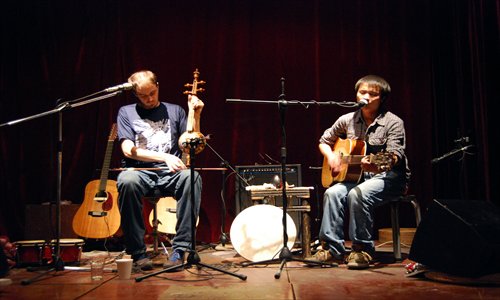Straight from the throat
Music has the power to bring people of diverse backgrounds together, and for Colorado-born musician Andy Bauer and his Chinese partner Deel Guik (Diegui), their two-man band explores what they call "interethnic folk music." In Bauer's words, "the sound of music should take us far away to places that we cannot visit in the non-musical world."
This musical project, initiated by Bauer, is based on the personal experiences and cultural upbringing of both men. Each musician sets himself the task of combining his own native culture with two or more minority cultures in order to create a new musical hybrid. "What I have learnt through years of experimentation is that this kind of music-making isn't just cross-cultural, but is in fact, 'interethnic,' that is, the songwriter and singer make reference in a single piece to two or more ethnic cultures in terms of music, lyrics and instruments," Bauer told the Global Times.
Bauer and Guik use different vocal techniques and instruments in their compositions. Guik's works are mainly influenced by Miao minority music and folk songs that originate in his native Guizhou Province, while Bauer focuses on music from Tuva (a federal Russian republic) and American rock. "But an attentive listener to our music will find a fusion of elements in totally different musical styles, and that is part of our experimentation," Guik added.
Bauer usually plays a 12-string acoustic guitar during performances, while Guik accompanies him on Uyghur drums and various Uyghur stringed instruments, such as the Ghirjek (a type of Uyghur fiddle). Each writes his own songs, and work together to decide which accompaniments to use.

Throat singing
In Bauer's song lyrics, a variety of languages are utilized including English, Putonghua, Japanese, Uyghur, Russian and Thai, among others. And one of the highlights of Bauer's performances is his throat singing, a discipline he has been studying for 12 years, and which has been especially inspired by Bady-Dorju Ondar, a young Tuvan master of throat singing from Kyzyl, the republic's capital.
"There are different techniques and which use different parts of the vocal tract," said Bauer. "My area of special interest is a type of throat singing called Kargyraa, which is well-known for its deep timbre range. Kargyraa is said to evoke landscapes such as the country's steppes, mountains and forests through a process called 'boidus churumaly' in the Tuvan language which means 'sound sketches of nature.' In my music I work to integrate throat singing with different languages, such as Uyghur and Chinese to create a particular form of expression."
In 2008, Bauer traveled across China and along the former Silk Road, developing a passionate interest in central Asian music and culture. He has also played alongside some central Asian orchestras and rock groups, but has now been living and studying in Beijing for more than three years.
"I became seriously interested in the ethnic music phenomena after hearing a live performance of Tuvan Kargyraa in the US 10 years ago," he said. "This inspired me to learn more about other central Asian music cultures including Uyghur, Kazakh and Uzbek music. Regarding Chinese folk music, I only know about the techniques of ethnic groups in Xinjiang. I would describe my music composition process as 'interethnic' but I maintain that the style itself is deeply rooted in my American hardcore punk music upbringing; that is, it is full of thought, reflection, dissatisfaction and hope for the betterment of humanity."
Fluent in Hmong language of Miao People and Putonghua, Guik is a native of the Hmong minority (a branch of the Miao minority) in Guizhou Province. Also influenced by Western rock and world folk music, Guik started collaborating with Bauer earlier this year and they gave their debut show in Beijing in April. Guik tries to not only recreate his minority people's music in terms of his idea of "post-origins," but demonstrates a willingness to partake in other minority and majority groups.
Anthropological impact
Both men are postgraduate students at Minzu University of China in Beijing, and are studying the same major, anthropology. Bauer admits his "interethnic" music is something he has been engineering from anthropological findings for years.
"Broadly speaking, anthropology always challenges students to ask not only 'what is interesting?' or 'what sounds good?' but also challenges us to ask 'why does this sound good to some ethnic groups and sound bad to other ethnic groups?' Furthermore, it challenges us to consider 'what is music as a ritual doing to people in society unconsciously?' and 'what are the greater motives and functions of it?'" said Bauer.
Guik agrees that their anthropology major has taught them to have an open-minded attitude towards all art forms, as well as to understand and accept the differences between cultures. And their approach to this understanding and tolerance is through music.
"My music is also a reaction to globalization, as I fear its negative impact on cultural diversity," said Bauer. "I think that all people in their own way should try to work on the concept of plural identities, and this is considered by some experts to be a way of respecting ethnic cultures in such a high-tech, homogenizing world."
Date: December 7, 8:30 pm
Venue: 696Live
Address: Room 115, Bldg A, 188 Dongjiangwan Road
东江湾路188号创意产业园A栋115室
Tickets: 50 yuan (40 yuan for students or pre-sale)
Tel: 135-6488-3408
Date: December 8, 8:30 pm
Venue: River Side 河岸艺术空间
Address: A301, 160 Harbin Road
哈尔滨路160号"老洋行1913"创意园 A301 室
Tickets: 50 yuan (30 yuan for students or pre-sale)
Tel: 5632-0821